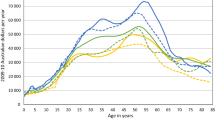Abstract
Intergenerational relations have been the cause for some important changes in social structure and did not receive much attention prior to the emergence of the industrial society.
Access this chapter
Tax calculation will be finalised at checkout
Purchases are for personal use only
Similar content being viewed by others
Notes
- 1.
There are two kinds of intergenerational relations have two kinds: familial and social (Wu and Li 2010). References to them in this book are the social kind unless specifically noted as familial.
- 2.
China’s modernization process started in 1840. The first transformation is the overthrow of the Qing Dynasty and the establishment of the Chinese Republic of China in 1911. The second transformation is the founding of the People’s Republic of China in 1949. The third transformation is the economic reform and liberalization reform and opening up in 1978 (Li Peilin et al. 2008: 62–77).
- 3.
The first time was in 1965, when Mao asked all the high school graduates to go to the farms, factories, and the military to receive some training before going to college.
- 4.
The Four Haves describe the four things that young revolutionaries should have: vision, ethics, culture, and discipline.
- 5.
Many studies since the mid to late late 1980s have confirmed that there is no significant difference in character between only and non-only children (Liu 1988; Bao Sidun et al. 1989; Jiao et al. 1992; Hu 1996). “Generally speaking, the social development of only children in the cities is normal. There are more similarities than differences in social development between only and non-only children” (Feng 2000). The author believes that the difference between the earlier and later findings is caused by the extra love and care the parents and grandparents gave to the only child at the beginning of the one-child policy. Later, when there were more and more only children, they were no longer deemed special, and the adults did not attempt to raise them differently.
- 6.
“A Single Man Avoids Going Home for Seven Years to Escape Forced Marriage”, Yangcheng Evening News, January 22, 2014: http://www.ycwb.com/ePaper/ycwbdfb/html/2014-01/22/content_354257.htm?div=-1.
- 7.
From Liren section of the Analects.
- 8.
“Friendly Advice to a Son”, Baidu Encyclopedia, the 4th update, November 20, 2013: http://baike.baidu.com/link?url=KRGsf891X0HZY6v0x8dPBzsVm4jfFXcalLpVZNqbh2d7gyU_VNbeIJv6Xgrqy2YwlzRMSY96AqLlza6YgBZEaa.
- 9.
Enculturation is a process in which a human individual adapts to his or her culture and learns to behave in a way that is appropriate for his or her status or role (Winick 1984: 185). See also Zhong (1993), Enculturation and the Generational gap, Beijing: Research in Sociology, Issue 1.
- 10.
The vector of socialization is the progress, direction and starting point of socialization. See Zhou (1995b), “Transcending Intergenerational Opposition”, Nanjing: Journal of Nanjing University (Philosophy, Culture, and Sociology) Vol. 2.
- 11.
P. Mitev, Socialization and the Youth, Bucharest; Youth-Study-Action, 1977, 102101-103. From Zhou (1995b), “Transcending Intergenerational Opposition”, Nanjing: Journal of Nanjing University (Philosophy, Culture, Sociology) Vol. 2.
Author information
Authors and Affiliations
Editor information
Editors and Affiliations
Rights and permissions
Copyright information
© 2017 Springer Nature Singapore Pte Ltd. and Social Sciences Academic Press
About this chapter
Cite this chapter
Shen, H. (2017). Intergenerational Relations. In: Zhou, X. (eds) Inner Experience of the Chinese People. Research Series on the Chinese Dream and China’s Development Path. Springer, Singapore. https://doi.org/10.1007/978-981-10-4986-6_9
Download citation
DOI: https://doi.org/10.1007/978-981-10-4986-6_9
Published:
Publisher Name: Springer, Singapore
Print ISBN: 978-981-10-4985-9
Online ISBN: 978-981-10-4986-6
eBook Packages: Behavioral Science and PsychologyBehavioral Science and Psychology (R0)




